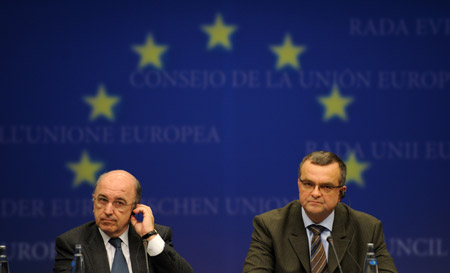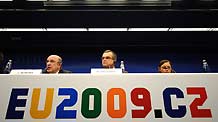EU Finance Ministers Agree to Coordinate in Handling Toxic Assets
Adjust font size:



 |
|
EU Commissioner for Economic and Monetary Affairs Joaquin Almunia (L) and EU's rotating country Czech's Finance minister Miroslav Kalousek attend a press conference after the EU Finance ministers meeting in Brussels, capital of Belgium, on February 10, 2009. [Xinhua] |
Czech Finance Minister Miroslav Kalousek, whose country holds the EU presidency, told a press conference after chairing a meeting with his EU colleagues, that the ministers agreed coordination was needed to deal with the toxic assets on the balance sheets of banks.
He said transparency and public support was needed as the evaluation of toxic assets was "extremely difficult" and would require "enormous work," adding that national experiences could contribute to the evaluation of such assets.
The EU's Economic and Monetary Policy Affairs Commissioner, Joaquin Almunia, said at the same press conference that the European Commission would "present guidelines on how to evaluate and tackle toxic assets in a couple of weeks," as supported by all the ministers.
He said there may be "a range of tools" for EU members to choose to best fit their banking sector, and flexibility was needed as the situation in each of the member states was different.
Other schemes, such as Britain's plan to insure the bad assets and the Netherlands' mechanism, should also be considered.
He suggested that shareholders share some of the burden of the bad assets.
Removing toxic assets from the balance sheets of banks would relieve them from potential losses and therefore boost lending and restore market confidence, he said.
Toxic assets of banks in Europe have currently become a major problem hindering lending and thus economic recovery.
(Xinhua News Agency February 11, 2009)
